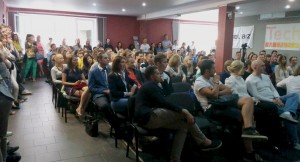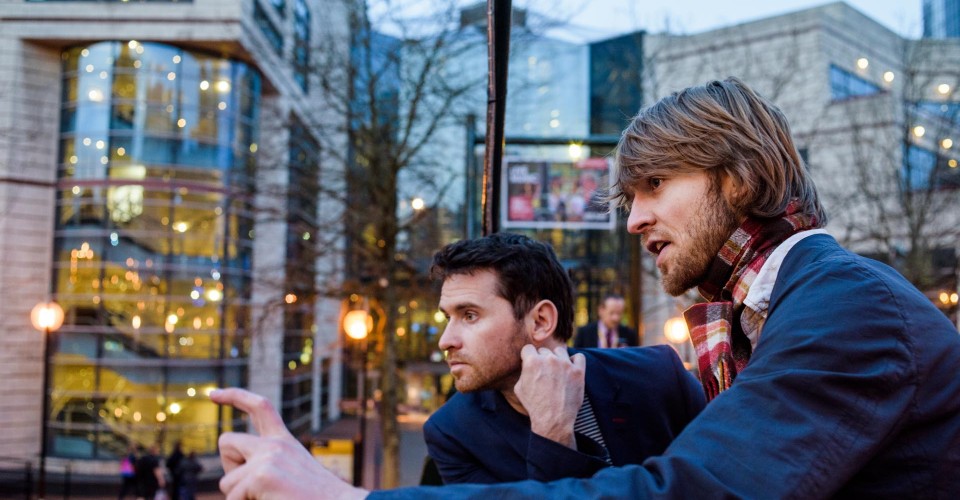I got to talk to Kiryl Chykeyuk, a co-founder of Kino-mo startup, when he was visiting Belarus, his motherland, at a rendez-vous he held with the local startup community. The venue was jam-full with people, and Kiryl, seen as a role model by many members of the local IT community, patiently and sincerely answered every single question. Important to say that Kino-mo relied on the active support of fellow compatriots who voted for them in finals of Pitch To Rich, a UK nationwide competition among entrepreneurs organized by the founder of Virgin Group Richard Branson.
In the finals, Kiryl and his business partner Art Stavenka pitched Kino-mo display to business-guru and billionaire Mr. Branson. Dr. Yes, as Mr. Branson calls himself, and other jury members were impressed enough to award the victory in the Start-up category to Kino-mo.

Belarusian startup community greets Kiryl from Kino-mo
The product is supposed to shake up the out-of-home ads industry by providing brands with an efficient attention-grabbing and action-encouraging tool. In fact, the so-called 3D display is not the duo’s first product. A year earlier they reinvented the wheel bringing a Kino-mo video-bike to the outdoor ads market, which made them winners of BBC Dragon’s Den, Cambridge University Entrepreneurs Award and Shell LiveWire Award. Video bikes were featured in marketing campaigns of Intel, Samsung, General Electric, and other big brands and made around $200,000.
Achievements
The physics behind the two products is similar, but 3D displays promise a much more scalable and yielding business. They already have an exclusive partnership arrangement with D-Media, a digital media agency in the UK with a strong advertising network in bars, restaurants and nightclubs.
Outside the UK, they have partners in 4 countries and got a few hundred partnership proposals from all over the world since they won Pitch to Rich. Interestingly, Kino-mo hasn’t spent a penny on advertising and marketing yet, so we are looking forward to seeing the impact of the £150,000 marketing campaign from Virgin Media (the prize in Pitch to Rich) that will start in September 2015.
KINO-MO Know-how
Kiryl and Art are both from Belarus, but they founded the company Kino-mo in England where they came for PhD programs in biomedical engineering and political economy, respectively.
In principle, the 3D display is a propeller-looking unit with a patented combination of chips, magnets, and LEDs. When the blades rotate, they create an illusion of content hovering around in the air, visually similar to holography. It took 1.5 years to assemble the first prototype of the display.
Since the manufacturing costs of the 22-inch device on the picture below is around £380, and the cost of holography is prohibitively high for many marketing campaigns, Kimo-mo made a breakthrough in Out-of-home advertising by making the hologram effect affordable.

Propeller-looking device translating holography looking images. By Kino-mo
Kino-mo business model
The founders chose Kino-mo to be a lean company providing technology and know-how and will completely outsource the manufacturing of its devices to China. Currently, they are trying to build a reliable supply chain. From the monetization point of view, the company will sign licensing agreements with ads agencies around the world, and the latter will operate the network of 3D displays and ad campaigns in high-footfall locations and pay royalties to Kino-mo. Kino-mo will provide them with a software platform to manage the ad messages sent out to the network of displays and technical support.
How the startup started
“We’re childhood friends, we grew up together on the same street in Brest [a regional city in Belarus],” Kiryl said, “and we always wanted to create a business together. When we moved to the UK for PhD studies, I was in Oxford, Art in London, we visited each other quite often and exchanged ideas.”
The friends say that they are an inspiration to each other. And by the way, the idea with bikes came into their mind while they had a relaxing beer on the banks of the Thames. They paid attention to the fact that there are so many biking people in the city making around 400,000 trips per week, and this could be an efficient advertising vehicle…
Currently Kino-mo team is composed of Kiryl and Art themselves, lead engineer Dmitry Malinovsky who works remotely from Belarus, a developer, an industrial designer, and a marketing guru and mentor Stevie Spring. As in any startup the team went through ups and downs, but according to Kiryl, when Stevie said “I’m in!” in the end of their first conversation it was a shining moment for them and a reliable indicator that they are going in the right direction.
Idea from the editor
For Kino-mo bike division it would be cool to partner with self-service bike rental systems and create huge and powerful advertising network. For example, bikeshare Vélib’ in Paris has 1229 rental points and more than 270.000 annual subscribers. In 2014, 200 mln commutes were made on Vélib’, with one bike rented every second.
Bike sharing is also very popular in other big cities, including vélo’v in Lyon, Orleans, and Toulouse, Willo! in Brussels, Call a Bike in Berlin and Stuttgard, Munich and Cologne, Citybike Wien in Vienna, DECOBIKE in San Diego (USA). The majority of successful bike sharing systems are operated by JCDecaux.
Stevie Spring is a high-profile professional in marketing and she used to be UK Chief Executive of Clear Channel, the world’s largest radio, out of home and live entertainment company. She is among Britain’s 500 most influential people according to Debretts and one of the UK’s 100 most connected women according to GQ magazine, and it is hard to overestimate the value of her expertise and network for Kino-mo.
Exit strategy
Kino-mo is now at a very exciting stage when it is clear that the startup will succeed and will potentially turn into a multi-million company. We were curious what are the founders’ plans for the future and if they see themselves as CEOs of a global company or they will delegate the management to experienced executives. “We will first build a strong brand and efficient processes, and then we might think of hiring a professional CEO and moving to a new project,” Kiryl said. “As for the exit strategy, selling out Kino-mo is also possible in the future if there is a compelling offer.”










